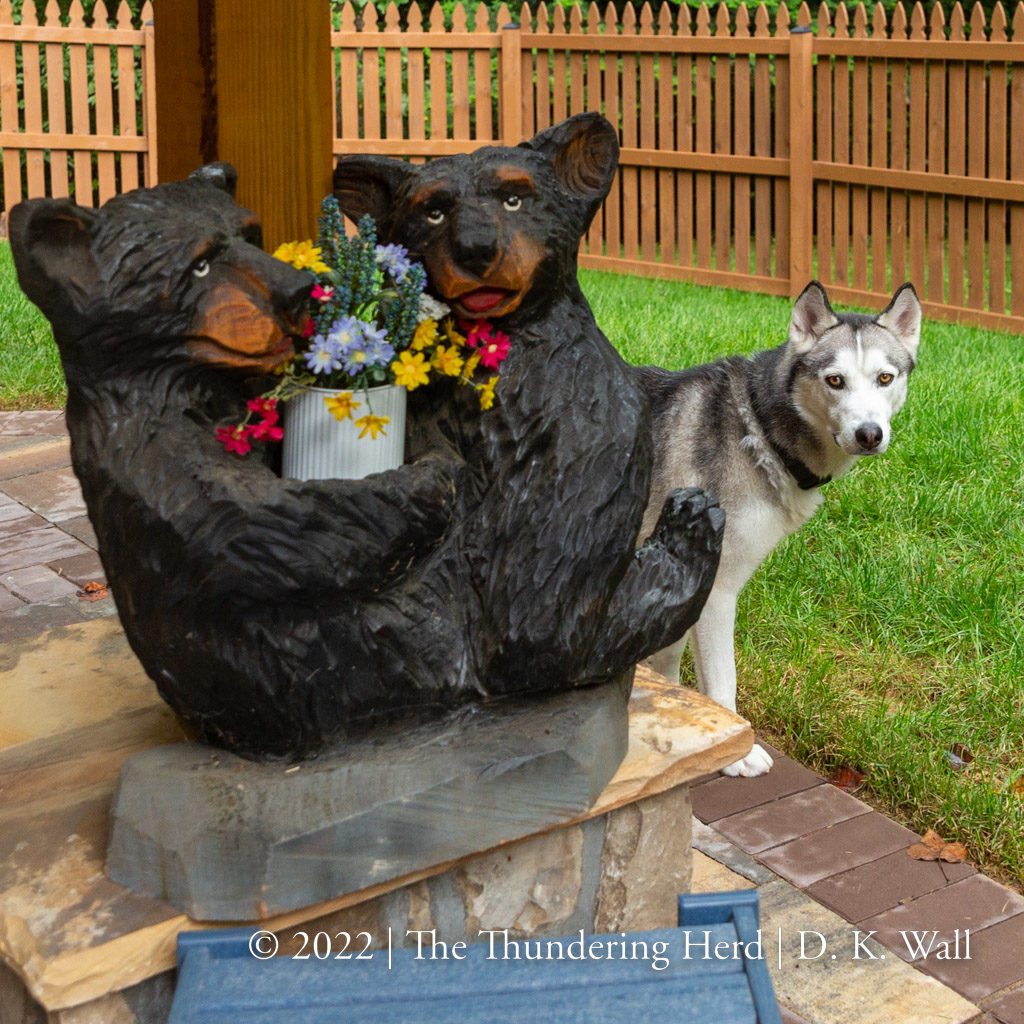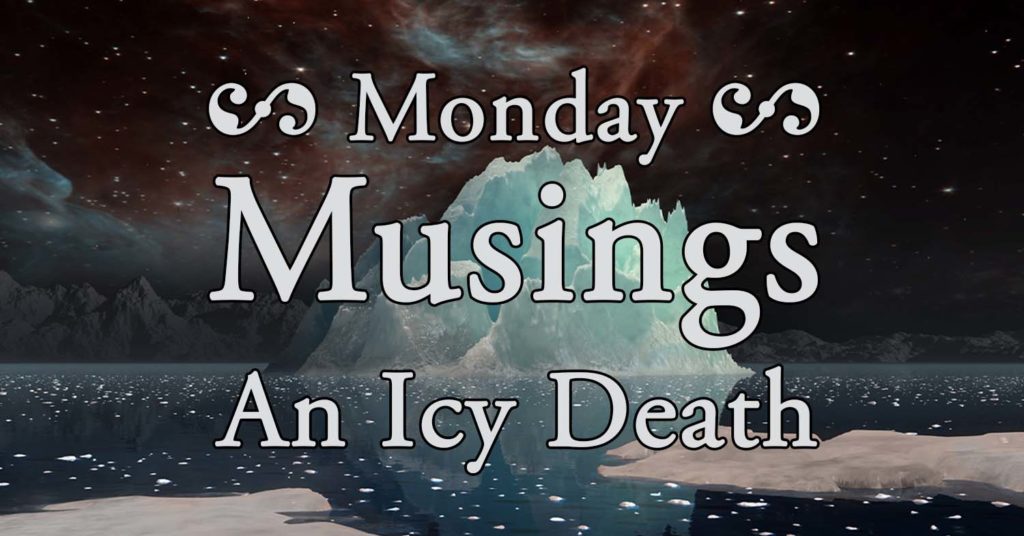Share This Musing
Musing: An Icy Death
The moonless night cloaked the iceberg bobbing in the North Atlantic swells. After another warm day, the temperatures plummeted with the sun. The surrounding water was frigid—too cold for human survival, and too warm for ice. Within a week—maybe two—the melt would be complete and the iceberg would merge with the ocean.
For something nearly 15,000 years old, the last remaining hours would pass in the blink of an eye. Until just three years earlier, it was part of the massive ice sheet covering western Greenland, millennia of construction followed by glacial movement over land. As the sheet approached the ocean, it weakened. Each summer, under the heat of the sun, giant chunks of ice broke away and slipped into the ocean.
The Greenland glaciers calve thousands of icebergs annually. Some crumble and disintegrate in hours or days. Others—as big as small cities—drift in the shifting currents for months and even years.
This iceberg—towering a hundred feet into the air and nearly two miles wide at its birth—is huge but nowhere near the biggest. It never even earns a name, as some do, living in anonymity as it floats. Its claim to fame—thus far—is solely that it’s the one in a hundred that survived those three years, a rare but not unique happening. Caught in the Labrador currents, its fate is sealed as it melts. Only oblivion waited for it, forgotten in history as it dwindled to nothingness.
In olden days, it would remain a threat to ships even as it shrank in size. Their wooden hulls were no match for the sharp, frozen barbs ripping gashes for the incoming water. The larger the breach, the faster the inflow, the quicker weight sunk the ship to greater depths that only increased the pressure and sped the flow. Within minutes, the boat disappeared beneath the surface and left only a scarred iceberg as a floating grave marker.
But man had learned from these disasters. Steel replaced wood, hardened against the frozen threats. When a breech occurred, interior compartments contained the water. Wounded, but afloat, the ship could make its way to the nearest port for needed repairs. The shipbuilders knew their superiority and shouted it to the world—their vessels were unsinkable. Captains no longer feared a watery grave.
The iceberg flipped in the water, its bottom becoming its top. As the lower portions melt, the upper becomes top heavy and they need to rebalance. The smaller they become, the more frequent the somersault. The iceberg is in its death throes as the clock ticks.
That flipping causes ripples in the water, giving sailors a sign of a submerged danger. Even with the steel and engineering, captains are cautious of the floating threats. The smaller ones are less likely to cause damage, yet they are also the hardest to see. And on a calm sea, at night, without a moon—such as the night our tale centers on—little visual clues exist.
Movement over the horizon. Perhaps another tired iceberg waiting on its demise. The water lapped. The iceberg rocked. And melted. Ever closer to extinction.
But then the shadow on the horizon came into view. Unlike the bergs without even moonlight to glisten off their surfaces, the approaching ship glowed with its own light. Despite the late hour, sound floated across the sea to the iceberg. Laughter. Revelry. Celebration.
But not alarm. Never an alarm.
And the iceberg waited silently. Lonely. Melting.
If the ship passed a week later, the iceberg would have been gone. If it passed a mile north or south, they would never have met. If it traveled slower or faster, they would have never known of each other’s existence.
But they were on a collision course.
Someone on board noticed the looming menace. The giant ship began its turn in the water. No klaxon alerted the passengers to the impending danger—no one wanted to disturb them at this late hour—but nothing could have been done, even with a warning. The next seconds rested on the experience of the crew and the nimbleness of the ship.
All the helmsman wanted to do was pass around the edge of the unremarkable iceberg. If that happened, no fame would ever come to it. It would disappear, nameless and unimportant. The incident would be a minor inconvenience to a passing traveler and logged into the ship’s records.
But the beast of a ship was too big. Its speed to great. The sighting of the lurking danger too late. The turn too slow. They didn’t miss. They collided. A thunderous cacophony of ice and steel battling against each other. Neither won, both mortally wounded.
The impact hastened the iceberg’s end. Broken into smaller pieces that would melt faster, its time grew shorter. But its existence would now be remembered.
The ship should have survived. They built it to. For decades, scholars would analyze survivor testimonies. Did a fire in a coal bunker weaken the hull? Did the captain’s decisions to continue ahead exacerbate the damage? Did the radioman’s message not communicate the urgency? Did the crew realize too late that the unsinkable ship was actually quite sinkable, and much faster than anyone expected? Less than three hours after the impact of an anonymous and dying iceberg, the Titanic sunk, taking 1517 people to an icy death.
The iceberg spent its last days in the same anonymity as it spent millennia. Photos exist of different icebergs in the area, but no one is sure which one it was. Within a short time, though, it melted away in the warmer waters, no longer a threat to shipping.
Forever anonymous, yet forever infamous.
This Week’s Inspiration
Last week, I read “The Incredible Story of the Iceberg that Sank the Titanic” in the Smithsonian magazine. The article is an excerpt from Sinkable by Daniel Stone.
My original draft mused on the unlikely chances that conspired to take down the mighty ship, and to compare that to the choices we make in life that have so many unintended consequences. But my introductory focus on an iceberg took on a life of its own. Forgive a creative mind for its wandering nature. Just one of those quirky chances, I guess.
Before someone posts a comment, let me clarify that I can’t vouch for the veracity of the article. I’ve seen varying lengths of the iceberg’s life cycle and numerous contradicting opinions of what really happened.
Understand that facts rarely interfere with the imagination’s ability to conjure a story. As I always say, my stories are 100% true—except for the parts I make up.
Gratuitous Dog Picture: Bear Watch

Always a little exciting when some of our neighborhood bears wander by the house, particularly a mom and the cubs she’s been diligently raising this year. Roscoe P. considers himself the head of bear watch and would like to report that he’s found a pair—inside the fence. They look a wee bit less threatening than mama bear protecting her precious cubs, so good job, Roscoe.
On The Website This Week
Vocabulary Word of the Week – Polysemous
July survey results – Who Buys From Bookstores?
Take the August survey – Pumpkin Spice: Love it or hate it?
Beware of any lurking icebergs in your weekly plans. See you next Monday.
Support The Musings
Call it a tip. Or the euphemestic "Buy me a coffee." I prefer patronage. Generous patrons have supported artists throughout history. Whatever you want to call it, if you enjoyed this post, consider making a donation to help offset my costs. Your support will help keep my stories ad free.3 Comments
Leave a Comment
Monthly Reader Survey
Each month, I ask my readers a question or two. Sometimes, my questions are random fun things that have nothing to do with books. Other queries are about reading and writing. Join in the fun and answer this month's survey. The results (and a new survey) will be shared later in the month.
Monthly Reader Survey
Each month, I ask my readers a question or two. Sometimes, my questions are random fun things that have nothing to do with books. Other queries are about reading and writing. Join in the fun and answer this month's survey. The results (and a new survey) will be shared later in the month.


Hu-Dad-I have always been amazed and yes-scared-of the sinking of the Titanic!!! I too wonder how much of it was from the captain’s error?
Good job Roscoe P on the bear watch(and it’s TOO adorable)!!
Always wondered if the Titanic had survived, would it have met the same fate as the Lusitania.
Happy bear days to you Roscoe P.
I got to see a glacier calf a small iceberg this past week in Glacier Bay. Amazing power! I can only imagine what a huge iceberg looks and sounds like.
As for the Titanic, I really glad my great grandparents decided to delay their return to the US and did not board the Titanic as originally planned (However, some of their neighbors in San Francisco received quite a shock when the family, presumed dead, reappeared in November 1912).